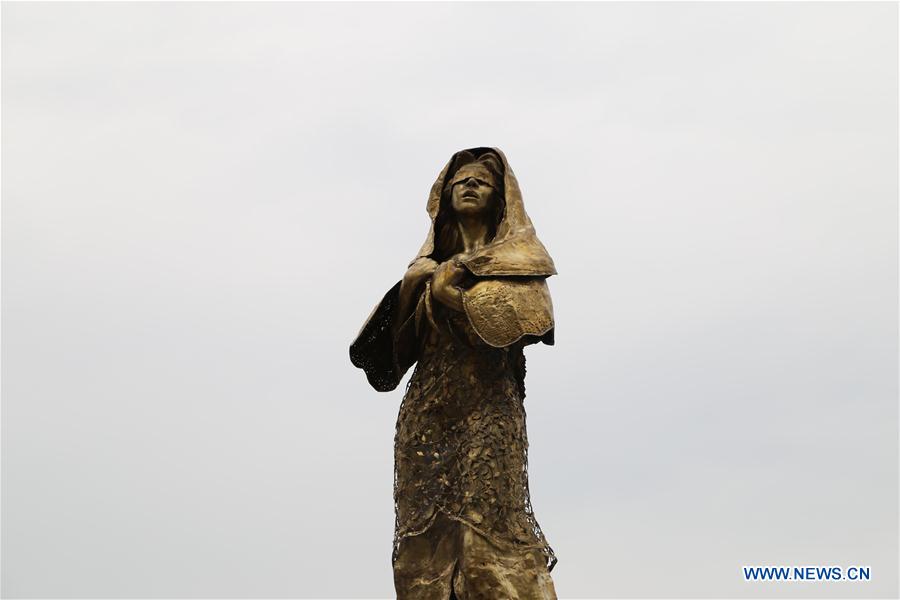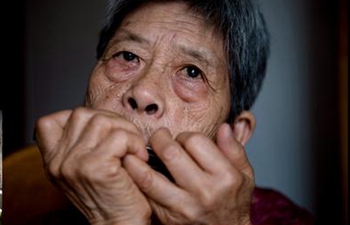
Photo taken on Dec. 8, 2017 shows a statue representing the "comfort women" in Manila, the Philippines. The Philippines unveiled a statue representing the "comfort women" in Manila on Friday, who were forced to work as sex slaves for Japanese soldiers during World War II. (Xinhua/Dong Chengwen)
MANILA, Dec. 8 (Xinhua) -- The Philippines unveiled a statue representing the "comfort women" in Manila on Friday, who were forced to work as sex slaves for Japanese soldiers during World War II.
The seven-feet bronze sculpture depicts a blindfold, grieving woman in Maria Clara traditional Filipiniana gown.
"This monument is a reminder of the Filipino women who were victims of abuses during the occupation of the Japanese forces from 1942-1945. It took a while before they came out into the open to tell their stories," read the inscription on the monument.
Forty-year-old Filipino sculpture and portrait painter Jonas Roces made the "more-than life-sized" bronze art work dubbed Filipino Comfort Women. The memorial statue stands on the baywalk in Roxas Boulevard fronting the Manila Bay famous for its sunset, a few km from the Japanese embassy compound.
The unveiling took place 76 years after the Japanese invasion of the Philippines that started on Dec. 8, 1941, 10 hours after the attack on Pearl Harbor. The Japanese Imperial Army occupied the Philippines between 1942 and 1945 during WWII.
It's estimated that up to 200,000 women in their teens from Asian countries including South Korea, China, Indonesia and the Philippines, were forced to work in Japanese wartime military brothels.
To keep alive the memories of the "comfort women," similar memorial statues in South Korea, China and San Franciso, the United States have been erected.
National Historical Commission of the Philippines Chairman Rene Escalante told Xinhua that the memorate was built up "in order to preserve the memory of the comfort women during the Second World War."
"This is part of the dark episode of the war and not many people are aware of this. They have been fighting for their right, fighting for justice and I think this monument is one of the responses that the government could offer to them. The ultimate objective of this is to prevent a repetition of a similar event in the next generation," Escalante said.
He said the war has inflicted painful memories especially to the thousands of Filipino women who were raped by the Japanese soldiers during the war. The issue of war sexual slavery is a sensitive matter that is usually not discussed, so it took these women years to come out in the open and tell their brutal stories, he said.
However, some of the victims opted not to speak about their ugly war experience under the Japanese forces. Several decades later, Escalante said many "comfort women" are still clamoring for justice.
Manila Mayor Joseph Estrada lauded the installation "of yet another historical marker" in Manila.
"Like others before it, this reminds us of a chapter in our past. Whether it reminds us of an event, a place, or an honored person, it is nevertheless worthy to be remembered for its impact on our nation. This morning we remember the plight of the comfort women," Estrada said in a speech read by his representative during the unveiling ceremony.
"While we cannot erase all of their pain and suffering, we can at least do our humblest best to show them that they are not alone. Through this marker, we are expressing our intention never to forget what they went through, and to do all we can to make sure such a tragedy never happens again," he added.
Rechilda Extremadura, executive director of Lila Pilipina, an organization of WWII comfort women, said that her organization collaborated with the commission in conceptualizing the statue. "I was the one who suggested that the woman wears a Filipiniana dress," she said.
"Our objective really is to raise the awareness of the Filipino people about the plight of the comfort women, not just in the Philippines but also in Asia, so that they will not forget. We especially want to remind the younger generation that there is such thing as victimization of war by the Japanese," she told Xinhua.
Lila Pilipina (League of Filipino Women) has documented 174 "comfort women" who have gone public since early 1990s. Only a few of them remain alive, according to Extremadura.
"Only one lola (grandmother) can move around now. She's in her late 80s. They are dying fast. It's very sad. They died without getting justice," she said, explaining why not a single surviving "comfort women" made it to the unveiling ceremony.
Another group, the Malaya Lolas (Free Grandmothers), has documented 90 but the number dwindled to a few following the death of the rest over the years.
Both groups are demanding: official apology, just compensation and inclusion of the comfort women issue in Japan's historical accounts and textbooks.
However, the Japanese government has officially denied and continues to deny the existence of a "comfort system" in Asia during WWII.















